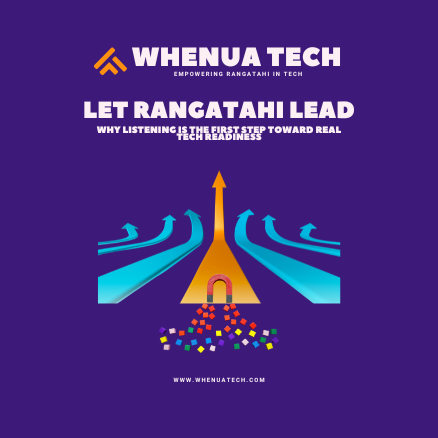At Whenua Tech, we often talk about the concept of “future readiness.” It’s a term you’ll hear echoed in education forums, workforce panels, and industry roundtables. But here’s the question we keep returning to:
Ready for whose future and on whose terms?
For us, the answer starts with rangatahi voice. Because if we truly want to design inclusive, future-facing learning experiences, we need to start with the people who are living that future right now. Rangatahi aren’t waiting for permission to engage with technology. They’re already in motion problem solving, tinkering, designing, coding, failing, iterating, and asking better questions than many of us adults.
Rangatahi Are Already Innovating—We’re Just Catching Up
Across our networks in Aotearoa and Australia, we’ve encountered rangatahi who are:
- Coding Discord bots to support their school clubs
- Building simple games in Unity based on kaupapa Māori themes
- Designing Canva infographics to spread awareness about environmental issues
- Using ChatGPT to write their first lines of Python or troubleshoot schoolwork
- Launching podcast episodes with local creatives and thinkers
They’re not waiting for a qualification to start. They’re starting with curiosity, and that spark when nurtured becomes a flame of capability.
What “Future Ready” Actually Looks Like
When we talk to employers, they tell us they’re not only looking for technical skill. They’re looking for:
- ✅ People who can communicate with confidence
- ✅ People who can adapt to fast-moving team dynamics
- ✅ People who’ve built something that failed and learned from it
- ✅ People who understand why they’re building not just what they’re building
At Whenua Tech, we believe true readiness is a combination of:
- Technical Proficiency – Coding, cloud, AI, data yes. But in real tools, with real purpose.
- Cultural Intelligence – Understanding identity, community, and designing in ways that serve people first.
- Project Experience – Getting your hands dirty, working in groups, pivoting when things go sideways.
- Self-awareness + Support – Knowing your own values, and having the right mentors to back you when things get hard.
And this doesn’t come from theory alone it comes from being invited into real mahi.
Listening First: The Whenua Tech Way
Our Bridge Model was designed not to control the direction of rangatahi pathways, but to co-create them. Here’s how we do it:
1. Kōrero Kanohi ki te Kanohi (Face-to-Face Conversations)
Before we hand rangatahi a laptop, we sit down with them. We ask:
- “What do you love doing already?”
- “What’s something you’ve taught yourself?”
- “If you could solve any problem in your community using tech, what would it be?”
This simple step unlocks a deeper motivation than any syllabus.
2. Co-Designing Modular Pathways
We don’t expect teachers to invent new content, nor expect rangatahi to resonate with outdated examples. That’s why we build Modular Resource Packs bite-sized, flexible, and aligned to industry need. These include:
- A real-world project brief (e.g. design a prototype app for a marae)
- A breakdown of hard and soft skills involved
- Tools and tutorials (TryHackMe, Canva, Google Sheets, etc.)
- Reflection prompts tied to Te Whare Tapa Whā
And yes rangatahi help us test these packs before they’re released.
3. Micro-Internships with Impact
We’re not about simulated environments we’re about applied learning. Through short-term paid placements, rangatahi:
- Support iwi data audits
- Build websites for Māori-led SMEs
- Participate in agile sprint cycles
- Deliver actual outcomes to real stakeholders
These experiences are game-changers. It’s not just the skills it’s the confidence that comes from being trusted with responsibility.
4. Ongoing Mentorship & Cultural Anchoring
We don’t believe in short bursts of inspiration. We believe in sustained support.
Each rangatahi in our incubator pipeline is connected to:
- A tech industry mentor who walks with them
- A cultural guide kuia, kaumātua, or whānau ally
- Their own whānau, who are invited into the process, not left outside it
It’s this ecosystem of technical + emotional + cultural mentorship that builds not only future tech employees but future tech leaders.
Our Challenge to Educators & Industry
Rangatahi don’t need another platform telling them what they should become. They need:
- Places to test what they already know
- People who believe in their voice
- Pathways that are flexible, not rigid
- Projects that honour their identity while expanding their horizons
So our challenge to those shaping the future of work and learning is this:
Will you listen first, or speak first?
Will you design for them, or with them?
In Summary
Rangatahi are not empty vessels waiting to be filled with knowledge. They are bold, creative, already experimenting with the future and they deserve learning environments that respect that.
Let’s stop treating youth voice as an accessory.
Let’s make it the foundation.
Because when rangatahi lead, the outcomes are stronger. The ideas are richer. The pathways are bolder.
And that, whānau, is what future readiness really looks like.


 We respect your inbox. Just meaningful insights, no spam.
We respect your inbox. Just meaningful insights, no spam.